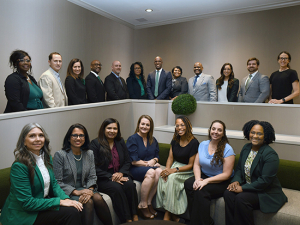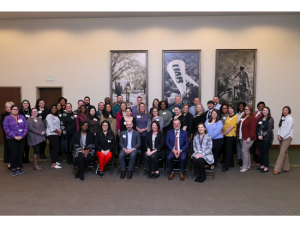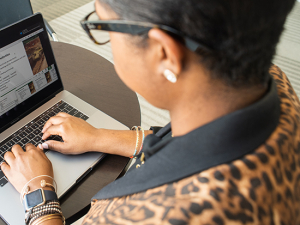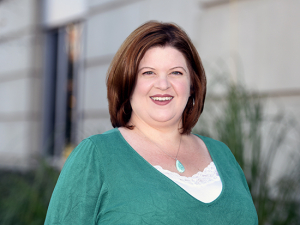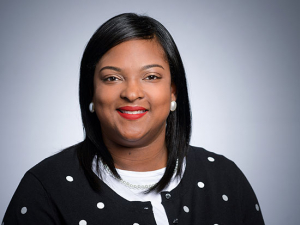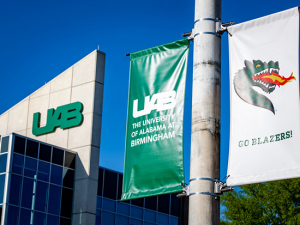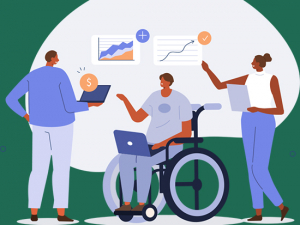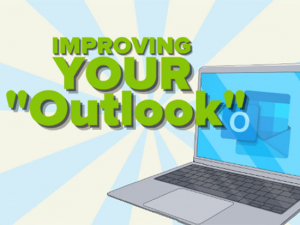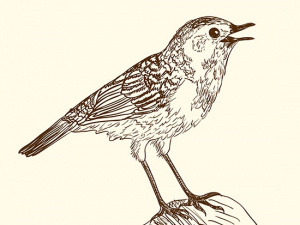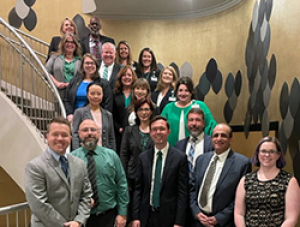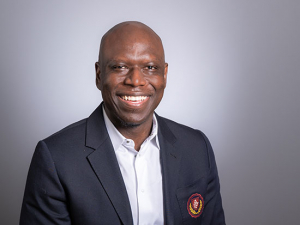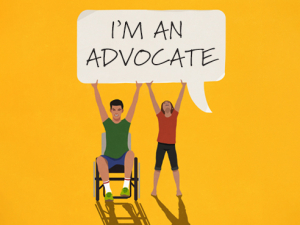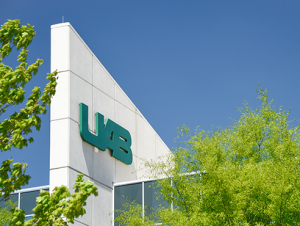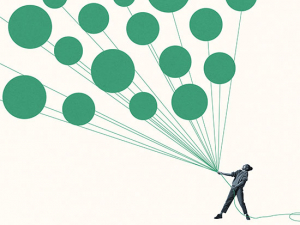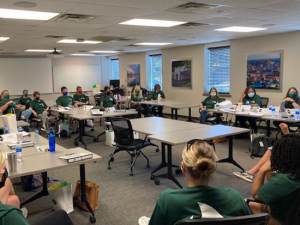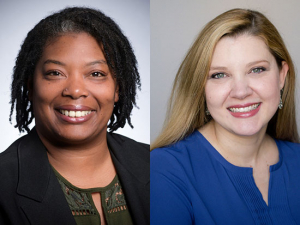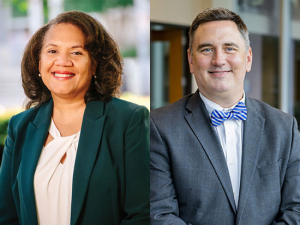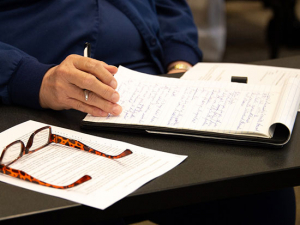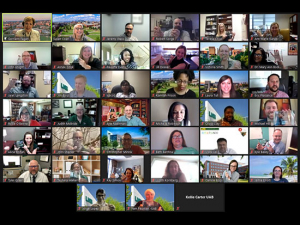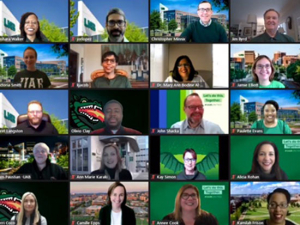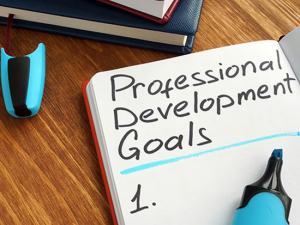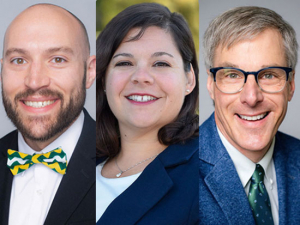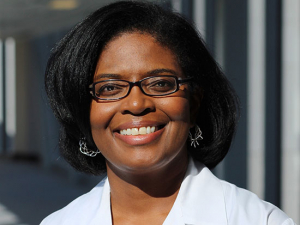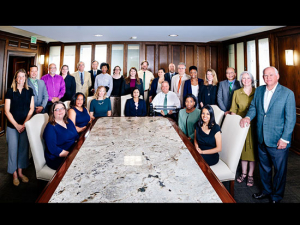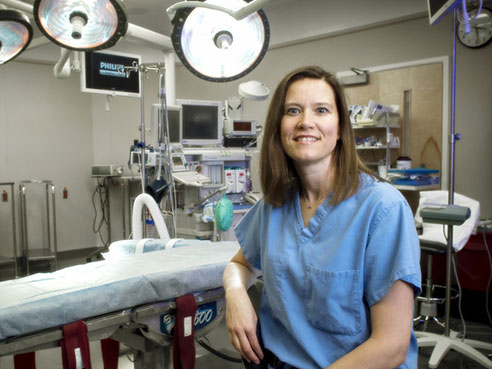 UAB transplant surgeon Jayme Locke recently shared six steps to building a dream career. Put them into practice with the free UAB resources below.To be a surgeon, you have to have confidence. “I tend to be grandiose in my thinking,” said Jayme Locke, M.D., MPH, director of UAB’s Incompatible Kidney Transplant Program and vice chair for Health Services Research in the Department of Surgery. “Dream big or go home.”
UAB transplant surgeon Jayme Locke recently shared six steps to building a dream career. Put them into practice with the free UAB resources below.To be a surgeon, you have to have confidence. “I tend to be grandiose in my thinking,” said Jayme Locke, M.D., MPH, director of UAB’s Incompatible Kidney Transplant Program and vice chair for Health Services Research in the Department of Surgery. “Dream big or go home.”
When you’ve helped start a pioneering transplant program, been featured on national television, changed laws in two countries and given hundreds of people, on two continents, a second chance at life, you’ve probably earned the right to believe, as Locke does, that “anything is possible with enough hard work and determination.”
But success and satisfaction aren’t the same thing. (See any NFL superstar’s contract talks.) So why does Locke say “I don’t feel like I come to work” and “I genuinely love what I do”? She shared the answer to that question, and her advice on career success, at a Sparkman Center for Global Health seminar in mid-September. Thanks in part to the Sparkman Center Fellows program, Locke had the opportunity earlier this year to extend a collaboration with transplant surgeon Elmi Muller, M.D., at the University of Cape Town in South Africa.
Opportunities abound for employees at UAB, in every job category — starting with the chance to learn from leaders in their field. With Locke’s seminar as inspiration and roadmap, here is a guide to finding your passion at UAB.
1. Define what success means to you
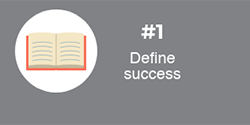 “I always knew I wanted to be a doctor,“ said Locke. But it was as an undergraduate volunteering in a pediatric cancer ward that Locke cemented her definition of career success. She became friends with a 7-year-old boy who was waiting for a bone-marrow transplant. “He was there for his second bone marrow transplant, and he was the first friend and patient I ever watched die,” Locke recalled. The boy’s mother gave Locke a card that included these words from Ralph Waldo Emerson: “….to leave the world a bit better, whether by a healthy child, a garden patch or a redeemed social condition; to know even one life has breathed easier because you have lived. This is to have succeeded.”
“I always knew I wanted to be a doctor,“ said Locke. But it was as an undergraduate volunteering in a pediatric cancer ward that Locke cemented her definition of career success. She became friends with a 7-year-old boy who was waiting for a bone-marrow transplant. “He was there for his second bone marrow transplant, and he was the first friend and patient I ever watched die,” Locke recalled. The boy’s mother gave Locke a card that included these words from Ralph Waldo Emerson: “….to leave the world a bit better, whether by a healthy child, a garden patch or a redeemed social condition; to know even one life has breathed easier because you have lived. This is to have succeeded.”
“Those words really shaped how I would fundamentally define success,” Locke said.
![]() Apply it: Are you dreaming of a career change? You may not have always known what you wanted to do, or even know exactly what you want to do now. UAB Organizational Learning and Development has a wide range of Learn Now Guides to help employees improve themselves at their own pace. The Career Development guide, for example, includes a video tutorial on launching a career-development plan and a self-assessment quiz to identify careers that align with your natural interests.
Apply it: Are you dreaming of a career change? You may not have always known what you wanted to do, or even know exactly what you want to do now. UAB Organizational Learning and Development has a wide range of Learn Now Guides to help employees improve themselves at their own pace. The Career Development guide, for example, includes a video tutorial on launching a career-development plan and a self-assessment quiz to identify careers that align with your natural interests.
Do you need more training to prepare for your ideal job — or are you looking to break into a hot field with new UAB programs such as the graduate data science and health care simulation programs or the bachelor’s degree in digital forensics?
UAB’s Educational Assistance benefit allows employees to take coursework for academic credit without paying tuition (course fees and textbook costs must be paid by the employee). These include traditional classroom-based programs and UAB’s expanding catalog of blended and 100 percent-online degrees. Not sure where to begin? Check out this Career and Major Exploration information from UAB’s Vulcan Materials Academic Success Center.
2. Opportunity is the prerequisite to success
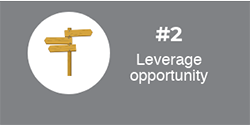 Locke said she has been “extraordinarily blessed” to have had a range of professional mentors. Her pathophysiology teacher opened her eyes to the intricate anatomy of the kidney, “which is the coolest organ by far in the human body,” Locke said. At Johns Hopkins University, where she trained as a surgeon, Locke met surgeon Robert Montgomery, who was one of the first in the United States to perform kidney transplants across blood group and tissue barriers. She learned how to do the surgeries and how to organize a pioneering program and advocate for change through the political system. Mentors also can share the tips that help achieve world-class expertise. Pointing at a picture of herself with fellow UAB transplant surgeons Mark Deierhoi, M.D., and Carlton Young, M.D., Locke said, “the number of ninja tricks these guys have taught me is just incredible.”
Locke said she has been “extraordinarily blessed” to have had a range of professional mentors. Her pathophysiology teacher opened her eyes to the intricate anatomy of the kidney, “which is the coolest organ by far in the human body,” Locke said. At Johns Hopkins University, where she trained as a surgeon, Locke met surgeon Robert Montgomery, who was one of the first in the United States to perform kidney transplants across blood group and tissue barriers. She learned how to do the surgeries and how to organize a pioneering program and advocate for change through the political system. Mentors also can share the tips that help achieve world-class expertise. Pointing at a picture of herself with fellow UAB transplant surgeons Mark Deierhoi, M.D., and Carlton Young, M.D., Locke said, “the number of ninja tricks these guys have taught me is just incredible.”
![]() Apply it: Faculty, physicians and postdoctoral students often establish mentoring relationships during their formal training. But in many careers, mentoring is less common; it can be difficult to know where to begin. “We learned in the UAB Campus Engagement Survey that staff are eager for more professional development opportunities,” said David Rhodes, who recently completed his term as chair of the UAB Staff Council.
Apply it: Faculty, physicians and postdoctoral students often establish mentoring relationships during their formal training. But in many careers, mentoring is less common; it can be difficult to know where to begin. “We learned in the UAB Campus Engagement Survey that staff are eager for more professional development opportunities,” said David Rhodes, who recently completed his term as chair of the UAB Staff Council.
In response to that feedback from the Campus Engagement Survey, Organizational Learning and Development piloted a 16-week mentorship program this spring in partnership with the Staff Council. OL&D is currently looking into extending the mentorship program.
OL&D’s Learn Now Guide on staff mentoring offers advice on identifying an appropriate ground rules for mentors and mentees.
3. Keep everything in perspective
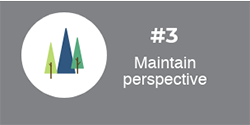 When Locke arrived at UAB in 2012 with the charge of launching an incompatible donor paired exchange kidney program, she was both excited and overwhelmed. “I remember feeling the absolute weight of the world on my shoulders and thought, ‘How am I going to do this?’” she said. “You’ve got to prove to yourself that you can.”
When Locke arrived at UAB in 2012 with the charge of launching an incompatible donor paired exchange kidney program, she was both excited and overwhelmed. “I remember feeling the absolute weight of the world on my shoulders and thought, ‘How am I going to do this?’” she said. “You’ve got to prove to yourself that you can.”
![]() Apply it: Everyone experiences stress in dealing with unfamiliar situations or responsibility. But it is possible to train yourself to think and respond positively. OL&D offers courses on dealing with change, running effective meetings and setting measurable and attainable goals.
Apply it: Everyone experiences stress in dealing with unfamiliar situations or responsibility. But it is possible to train yourself to think and respond positively. OL&D offers courses on dealing with change, running effective meetings and setting measurable and attainable goals.
4. Surround yourself with smart people
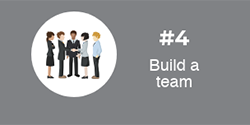 Determination can take you far, but it’s important to remember that “nothing built that was ever worth anything was built by one person,” Locke said. “You need to have a team working with you.”
Determination can take you far, but it’s important to remember that “nothing built that was ever worth anything was built by one person,” Locke said. “You need to have a team working with you.”
![]() Apply it: Employees who are already in leadership roles can access a number of learning resources, including online and in-person leadership development training for themselves, and workshops for developing their teams.
Apply it: Employees who are already in leadership roles can access a number of learning resources, including online and in-person leadership development training for themselves, and workshops for developing their teams.
No matter your employment category, you can learn emotional skills such as developing positive relationships at work, effective listening skills and emotional intelligence, and hone new technical skills through UAB Learning System courses in everything from grant accounting and coding to stress management. More than 5,000 courses, accessible at any time and at no cost, are available to UAB employees through the university’s agreement with Lynda.com, including Learning Path courses on becoming a digital marketer, bookkeeper, project manager or web developer.
5. Remember your purpose
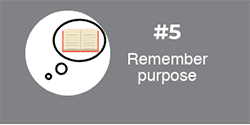 The “really big highs” of success are great but temporary, Locke cautioned. “It won’t always be that way. There will be days when every experiment you do fails and every analysis gets scooped. But that’s not the reason I get up every day. The reason I get up is to help others.” That includes her patients, but it also includes her students and junior colleagues, Locke said. “No matter where you are in your career, you can be a mentor to someone.”
The “really big highs” of success are great but temporary, Locke cautioned. “It won’t always be that way. There will be days when every experiment you do fails and every analysis gets scooped. But that’s not the reason I get up every day. The reason I get up is to help others.” That includes her patients, but it also includes her students and junior colleagues, Locke said. “No matter where you are in your career, you can be a mentor to someone.”
![]() Apply it: While UAB offers employees many opportunities, there are just as many ways to use your skills and passion to help your fellow workers and the surrounding community. Here are just a few:
Apply it: While UAB offers employees many opportunities, there are just as many ways to use your skills and passion to help your fellow workers and the surrounding community. Here are just a few:
Share your wisdom and experience as a mentor to youth in the Black Belt by joining the UAB-led GEAR UP Alabama’s Friday Bus Trips – or support local schoolchildren by helping high schoolers with their resumes or interview skills through the Birmingham Education Foundation.
Share your time by volunteering with UAB’s Blazer Kitchen at Medical Towers, which provides healthy food and resources to community members dealing with food insecurity — or by taking part in a UAB clinical trial to advance science. (Many need healthy controls and most reimburse participants for their time.)
If you like to work with your hands, you can register to volunteer (through Oct. 27) with the annual UAB Habitat for Humanity House build in the Crestwood/East Lake neighborhood.
Help fellow UAB employees cope with crisis through the UAB Benevolent Fund Employee Emergency Assistant Program, which has contributed $3.6 million through more than 4,200 awards. The program is just one of more than 130 charitable organizations supported by the Benevolent Fund.
Give a kidney: at least 18 altruistic donors have taken part in the UAB Kidney Chain, led by Locke. These are Good Samaritans who have given one of their kidneys to help someone in need even though they don’t personally know anyone who needs a transplant. If you think you could be the next, go here to learn more about the process — and watch Locke explain the need below in her speech at TedX Birmingham.
6. Look out for what's next
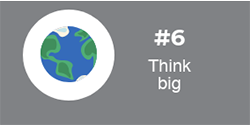 “There is always the next thing out there,” Locke said. Kidney failure is a problem around the world, not just in the United States. That’s particularly true in countries like South Africa, where 25 percent of the population is infected with HIV, which puts them at high risk for kidney failure. Looking to share her experience, and learn from South African peers, Locke met Elmi Muller, a transplant surgeon at the University of Cape Town. Patients with HIV rarely got kidney dialysis treatment or transplants. But organs from deceased donors with HIV often went unused because they cannot be transplanted into people without the disease. Muller was the first surgeon in the world to do HIV-positive to HIV-positive transplants. Locke, who had a longstanding interest in this issue, performed the Deep South’s first HIV-positive transplant in 2016, using insight she learned from Muller; meanwhile, in South Africa Locke shared her experience in establishing a living kidney donor program with Muller, who was interested in starting a similar program in Cape Town.
“There is always the next thing out there,” Locke said. Kidney failure is a problem around the world, not just in the United States. That’s particularly true in countries like South Africa, where 25 percent of the population is infected with HIV, which puts them at high risk for kidney failure. Looking to share her experience, and learn from South African peers, Locke met Elmi Muller, a transplant surgeon at the University of Cape Town. Patients with HIV rarely got kidney dialysis treatment or transplants. But organs from deceased donors with HIV often went unused because they cannot be transplanted into people without the disease. Muller was the first surgeon in the world to do HIV-positive to HIV-positive transplants. Locke, who had a longstanding interest in this issue, performed the Deep South’s first HIV-positive transplant in 2016, using insight she learned from Muller; meanwhile, in South Africa Locke shared her experience in establishing a living kidney donor program with Muller, who was interested in starting a similar program in Cape Town.
![]() Apply it: Do you have ideas on how to make a major change in your community? The UAB Grand Challenge, part of the Forging the Future strategic plan, calls on the entire UAB community, and beyond, to suggest visionary projects that UAB is uniquely suited to tackle. More than 75 project ideas, submitted in groups by several hundred individuals, flooded in during a first round of proposals in May. More than 200 UAB and community members met at The Club in August to discuss the proposals and develop formal teams around common topics. It’s not too late to submit an original idea: planning grant proposals are due by Sept. 30. Or you can join one of the 14 groups that coalesced at the workshop, around themes that range from educational equality to food security and telehealth.
Apply it: Do you have ideas on how to make a major change in your community? The UAB Grand Challenge, part of the Forging the Future strategic plan, calls on the entire UAB community, and beyond, to suggest visionary projects that UAB is uniquely suited to tackle. More than 75 project ideas, submitted in groups by several hundred individuals, flooded in during a first round of proposals in May. More than 200 UAB and community members met at The Club in August to discuss the proposals and develop formal teams around common topics. It’s not too late to submit an original idea: planning grant proposals are due by Sept. 30. Or you can join one of the 14 groups that coalesced at the workshop, around themes that range from educational equality to food security and telehealth.
